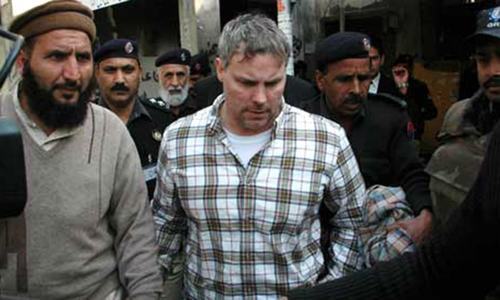WASHINGTON: “Let me state the question as clearly as I can, sir: Is the United States sending intelligence officers into Pakistan outside the normal CIA cover channels?” asks the ISI chief in a meeting with the CIA’s station manager at the agency’s headquarters in Islamabad. “Are you running a new game against us?” “You know I can’t answer a question like that. I mean, hell, we run all sorts of operations, declared and undeclared, just like you do,” says Homer Barkin, the station chief.
Ahmed Shuja Pasha, the ISI’s former director general, flies to Washington for a meeting with former CIA director Leon Panetta. When the two meet, he asks Mr Panetta “point-blank if I worked [for] the CIA. Panetta responded that I didn’t and that the State Department, not the CIA, was handling the matter,” says Raymond Davis.
“Gen Pasha was angered by Panetta’s response and grew even more so when Ambassador Cameron Munter, after clearing it with officials from the White House and the State Department, explained to him the exact nature of my job,” he adds.
The first quote is from a novel, Bloodmoney, by a senior Washington Post journalist David Ignatius; the second from Raymond Davis’s memoirs, The Contractor.
Davis, who is identified in the US media as a CIA contractor, says he did not work for the agency. He insists that he was an independent military contractor and his job was to protect American visitors to Lahore. The US media, however, still identifies him as a CIA contractor.
Davis killed two people in Lahore in Jan 2011, but was released after 49-days’ incarceration when the US government paid $2.34 million to the relatives of the two victims as blood money.
In interviews he gave to US media outlets about his book, Ignatius says the Davis case “eerily paralleled some of the plotlines” of his book.
“Here’s this real-life CIA contractor,” Ignatius says, “who is arrested by the Pakistanis, who it turns out is part of a whole capability not known to the American public [and] not known previously to Pakistan. At the end of the day, he’s released through a payment of blood money.”
Ignatius is perhaps the only American journalist who has access to the higher echelons of both the ISI and CIA. He has visited the ISI headquarters more than once and with its help also visited Waziristan.
The CIA too has given Ignatius similar access to its sources and assets. So, when his book was first published, in 2011, some doubted Ignatius’s disclaimer that this was “a work of fiction”.
“Plenty of readers will react to that claim with a nudge and a wink,” wrote Dan Fesperman, an author of seven novels. “For better and for worse, you emerge from its pages as if from a top-level security briefing — confident that you have been let in on the deepest secrets.”
And similarities between the two books show why fiction mirrors facts. Both books focus on the lack of trust between the United States and Pakistan, which leads the ISI to monitor the CIA’s activities in Pakistan. The CIA also has little trust in the ISI and yet both books show the two agencies working closely when they need to.
Raymond Davis details also how ISI and its former chief worked with US officials, particularly Ambassador Munter and Director Panetta, to get him released. The agency even persuaded the victims’ families to accept the blood money for his release, even though they were reluctant to do so.
Ignatius says that the clandestine operations he discusses in his novel were like a metaphor for the relationship between the US and Pakistan: “Each of us sneaking up on the other. The US not trusting the Pakistanis, they not trusting us. Each having good reason for the mistrust.”
In Bloodmoney, Ignatius imagines that the CIA, unable to carry out clandestine operations around the globe, creates a whole new secret wing — hiding behind a Los Angeles entertainment front called “Hit Parade”. Its aim is to buy peace in Fata, “warlord by warlord”.
Davis also talks about the presence of an alternative network of contractors, three of whom tried to rescue him when he killed two men in Lahore on Jan 27, 2011. But for them hiding their identity was even more important than rescuing Davis. So they leave him at the mercy of an angry crowd and escape when they realise that staying there could blow their cover.
Throughout the book, Davis talks about how in those 49 days of incarceration, his main concern was not to give his interrogators any information about those contractors. He even tried to delete his travel log to hide the routes he and his colleagues used.
Then there were these furtive visitors he was supposed to protect during their visits to Lahore, without letting Pakistani officials know who they were and what they were doing in Lahore.
In interviews about his book, David Ignatius also defines how the CIA and the ISI work with each other.
“The ISI is always playing both sides of the fence,” he says. But “it’s not really very different from the way the United States behaves. We conduct joint operations with the ISI, but there’s a lot that we don’t tell them” — or don’t tell them until it’s too late. Take, for example, the policy of concurrent notification, he says. “Concurrent meaning after the missile has been fired, and the target has been incinerated on the ground,” Ignatius says, “we’re telling (Pakistan) what we just did”. The CIA, he adds, “has the authority to conduct operations that the government will then deny ever took place”.
Davis’s book ends with the contractor returning home after paying blood money. The Bloodmoney ends with the CIA and ISI successfully destroying the network that was killing their operatives.
Published in Dawn, July 5th, 2017














































